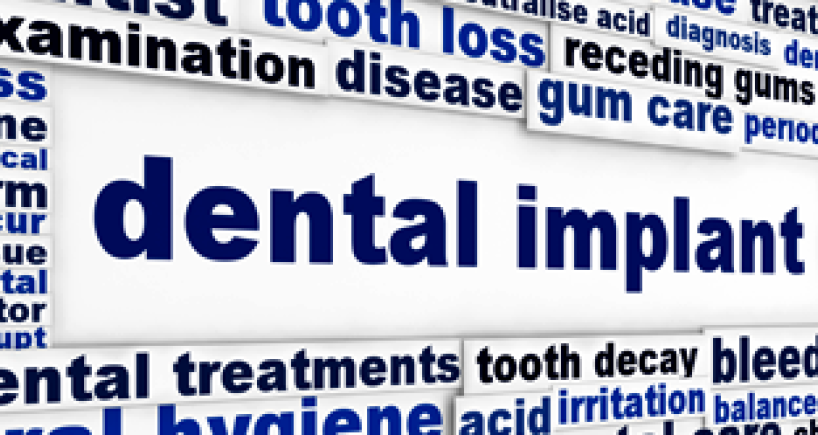
Dental Science
For That Perfect Smile
For That Perfect Smile Jul 28, 2014
 Dental implants provide a strong foundation for fixed or removable replacement teeth. But most importantly, they can bring back your smile
Teeth are an important part of human body which are meant to last for a life time, but during the course of time, teeth are lost because of many reasons which include cavities, gum disease, cracked roots and accidents. Missing teeth compromise your eating habits, speech and appearance. The loss of a front tooth will negatively affect the appearance of your smile and your self confidence. Losing a tooth in the back of your mouth can lead to numerous problems affecting your ability to chew, ability to clean your teeth and the health of your remaining teeth. Replacing a lost tooth will prevent further loss and save your remaining teeth.
What are Dental Implants
Replicating the natural function and appearance of your lost teeth can be difficult to accomplish. Dental implants are natural-looking replacements for missing teeth that also provide the same function as your natural tooth.
There are several options to consider when replacing missing teeth. Dentures and dental implants are the two most common solutions. The two differ in longevity, comfort, confidence while wearing.
Benefits of dental implants
Crowns, bridges and dentures are not ideal options when replacing missing teeth. Dental implants offer the look and feel of natural teeth. Implants offer stability because they are fused to your bone. Integration of the implants into your jaw bone also helps the replacement teeth feel natural and many people find this secure fit very comfortable.
Dental implants are an ideal option for people who have lost one or more teeth due to periodontal disease or an injury. Patients for dental implants need to have healthy gums and adequate bone to support the implant. A thorough evaluation by your dentist will help determine whether dental implants are right for you or not. Dental implants are actually more tooth-preserving than traditional bridgework, since implants do not rely on neighbouring teeth for support.
Replacing a single tooth
If you have lost a tooth due to an accident or from periodontal (pyorrhoea) disease, that tooth can be replaced using a dental implant. Your teeth stimulate or activate the surrounding bone with each bite. This preserves the integrity of the bone. When a tooth is lost, the bone is not stimulated and begins to shrink away. A dental implant keeps this bone intact and can prevent both bone loss and gum tissue shrinkage. Since a dental implant replaces the root structure, the jawbone is better preserved.
Replacing multiple teeth
Just as with one missing tooth, several missing teeth can be replaced with dental implants. Implant supported bridges are permanently fixed in the mouth, unlike removable appliances. Dental implants do not get cavities, but brushing and flossing are extremely important to maintain healthy gums and help in keeping plaque away from the bone and gum tissue.
Multiple teeth implants are a great way to add confidence to your smile with a truly snug fitting denture or getting rid of that ill-fitting partial denture.
Dental implants provide a strong foundation for fixed or removable replacement teeth. But most importantly, they can bring back your smile
Teeth are an important part of human body which are meant to last for a life time, but during the course of time, teeth are lost because of many reasons which include cavities, gum disease, cracked roots and accidents. Missing teeth compromise your eating habits, speech and appearance. The loss of a front tooth will negatively affect the appearance of your smile and your self confidence. Losing a tooth in the back of your mouth can lead to numerous problems affecting your ability to chew, ability to clean your teeth and the health of your remaining teeth. Replacing a lost tooth will prevent further loss and save your remaining teeth.
What are Dental Implants
Replicating the natural function and appearance of your lost teeth can be difficult to accomplish. Dental implants are natural-looking replacements for missing teeth that also provide the same function as your natural tooth.
There are several options to consider when replacing missing teeth. Dentures and dental implants are the two most common solutions. The two differ in longevity, comfort, confidence while wearing.
Benefits of dental implants
Crowns, bridges and dentures are not ideal options when replacing missing teeth. Dental implants offer the look and feel of natural teeth. Implants offer stability because they are fused to your bone. Integration of the implants into your jaw bone also helps the replacement teeth feel natural and many people find this secure fit very comfortable.
Dental implants are an ideal option for people who have lost one or more teeth due to periodontal disease or an injury. Patients for dental implants need to have healthy gums and adequate bone to support the implant. A thorough evaluation by your dentist will help determine whether dental implants are right for you or not. Dental implants are actually more tooth-preserving than traditional bridgework, since implants do not rely on neighbouring teeth for support.
Replacing a single tooth
If you have lost a tooth due to an accident or from periodontal (pyorrhoea) disease, that tooth can be replaced using a dental implant. Your teeth stimulate or activate the surrounding bone with each bite. This preserves the integrity of the bone. When a tooth is lost, the bone is not stimulated and begins to shrink away. A dental implant keeps this bone intact and can prevent both bone loss and gum tissue shrinkage. Since a dental implant replaces the root structure, the jawbone is better preserved.
Replacing multiple teeth
Just as with one missing tooth, several missing teeth can be replaced with dental implants. Implant supported bridges are permanently fixed in the mouth, unlike removable appliances. Dental implants do not get cavities, but brushing and flossing are extremely important to maintain healthy gums and help in keeping plaque away from the bone and gum tissue.
Multiple teeth implants are a great way to add confidence to your smile with a truly snug fitting denture or getting rid of that ill-fitting partial denture. 











